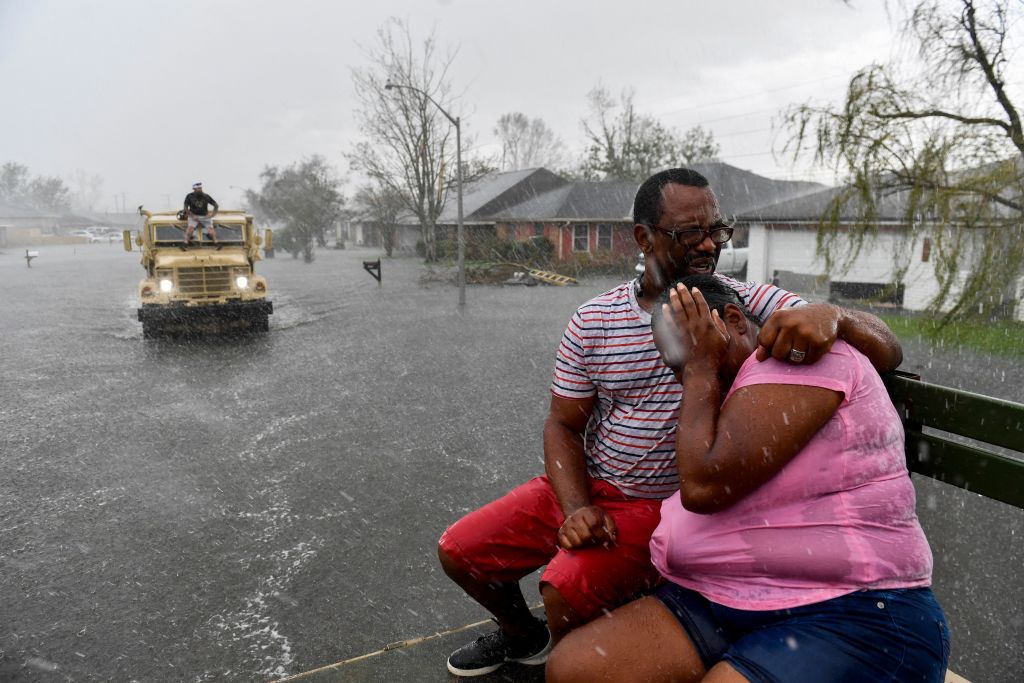Black Leaders In Louisiana Make It Clear: Climate And Racial Justice Go Hand-In-Hand
LaPlace, Louisiana on August 30, 2021, in the aftermath of Hurricane Ida. |Source: PATRICK T. FALLON / Getty
This summer has brought no shortage of extreme weather events. July was the hottest-recorded month on Earth, and deadly heat is continuing to threaten millions across the world. We’ve also seen record-breaking storms in the Pacific and Gulf, and flooding harming our nation’s infrastructure.
Extreme weather events are becoming the new normal, but Louisiana has lived this climate reality for a long time now, enduring loss and devastation year after year. Growing up in the marshy, humid environment of the Gulf Coast, the place I’ve called home my whole life, it’s devastating to see the people and places we love suffering from drought and fires. Louisiana is used to life-threatening weather events — from hurricanes to extreme flooding and tornadoes — but these new disasters pose another set of risks, especially for Black people.
Too often, the severe, unique harm Black communities face is left out of the conversation around extreme weather and climate change. This is despite the fact that Black people face higher rates of hospitalization due to heat-related illnesses. We are also 40% more likely to live in areas with the highest projected death rate increases due to changes in extreme temperatures. We cannot expect to change historically racist patterns that devastate communities if we don’t listen to those directly on the frontlines of both crisis and recovery and follow their lead. Without addressing environmental justice, there is no climate action.
Here in Louisiana, we constantly feel the impact of climate change and environmental racism, from the lack of just hurricane response to “Cancer Alley.” In our communities, we suffer from extreme heat, poor environmental infrastructure and unequal relief efforts. The Power Coalition for Equity & Justice fights against these injustices by regranting philanthropic resources into the hands of the people who need them the most. Following Hurricane Ida, the Power Coalition was able to move more than $250,000 into the hands of those most in need through mutual aid funds. The federal response could learn a lot from mutual aid efforts about how to provide relief and recovery for impacted communities.
Lower Ninth Ward residents stranded on the roofs wait for rescue boats in New Orleans, Louisiana, on August 29, 2005, following Hurrican Katrina. | Source: Getty Images / Getty
In my time as an advocate, I’ve seen the disparities in disaster relief that left Black communities behind in my own neighborhood. In the wake of Hurricanes Katrina, Rita, Gustav and Ike, I managed philanthropic funds to support relief, recovery and rebuilding efforts as the Vice President of Programs at the Louisiana Disaster Recovery Foundation, now the Foundation for Louisiana. We built our own policy leadership and infrastructure after Katrina to ensure that federal dollars would make it to the ground and not fall prey to disaster capitalism. I’ve also worked closely with Inclusive Louisiana, an organization founded by three of our elders dedicated to protecting the residents of St. James Parish and neighboring parishes from environmental harm and the long-term health consequences of industrial pollution.
Our experiences and those of too many Black Louisianans paint a stark picture of environmental racism and politicians failing to invest in and protect us. But our experiences also demonstrate the resilience of Black communities in the Gulf Coast. Recently, the Descendents Project successfully fought to overturn a 30-year illegal zoning ordinance that would have allowed Greenfield, Louisiana, to build a polluting grain terminal complex. This is an incredible victory for a community that has too often been silenced.
It is past time to protect ourselves against the climate crisis and pollution and slow, under-resourced recovery in the wake of disaster. To advance meaningful solutions, our elected leaders and voters can take three steps:
Stop polluting our communities: Don’t build petrochemical plants in primarily Black communities like St. James Parish, threatening our health and wellbeing. We deserve livable neighborhoods with clean water and air. We deserve actual monitoring and accountability for the industry.
Invest in equitable disaster recovery: Right now, the Power Coalition steps in during the aftermath of extreme weather to provide our communities with the resources we need to survive and rebuild by distributing direct cash assistance and aid for temporary lodging, food, medical supplies, and child care. We also help educate folks on what they need to do to prepare for hurricanes. But our federal, state and local leaders should be investing in resources to ensure equitable disaster recovery alongside us.
Elect leaders who will champion climate justice: This December, there is a special election for the Louisiana Public Service Commissioner (PSC), a constitutionally created and independent elected body. The PSC is not directed by the governor or legislature. They have no one to report to other than the voters who elect them into office. Commissioners have complete and absolute power to ensure safe, reliable, and reasonably priced public utilities for most of Louisiana.
Climate action must be intersectional. Without Black voices and needs in the discussion, our lives, health and homes will continue to be attacked by systemically racist policies and profit-hungry industry at the cost of lives. As made crystal clear in my home state of Louisiana, climate action without equity is racism. Listen, understand and include Black voices.
Ashley Shelton is the CEO of the Power Coalition for Equity & Justice, which builds civic engagement for Black communities across Louisiana.
SEE ALSO:
Climate Crisis: Black America Can’t Wait For Biden Administration To Deliver Environmental Justice
Environmental Racism: Pollution From Canada Wildfires Exacerbates Existing Air Quality Inequities
The post Black Leaders In Louisiana Make It Clear: Climate And Racial Justice Go Hand-In-Hand appeared first on NewsOne.

